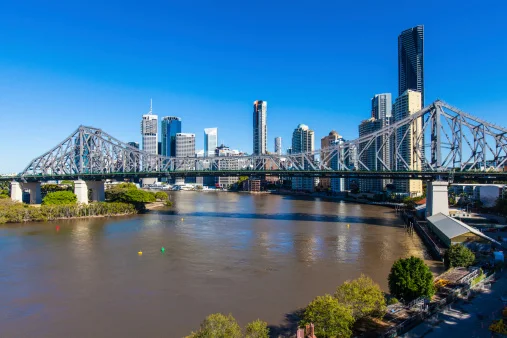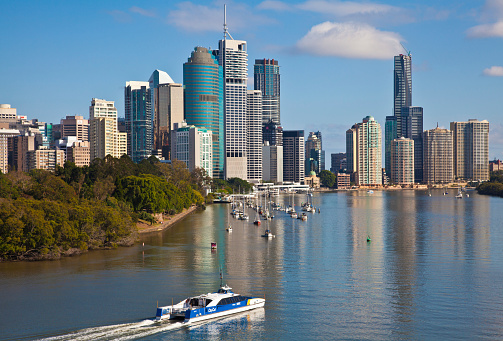Brisbane is the capital city of the state of Queensland.
About 2.5 million people live in the city.
The city of Brisbane, capital of Queensland, Australia
Find Brisbane on this map
The city covers an area of 3 080 square kilometres and is built on the Brisbane River on the east coast of Australia.
The city was officially named in 1825, by explorer John Oxley after Sir Thomas Brisbane who was the governor of New South Wales.
We acknowledge that the First Custodians of the land where Brisbane was built were the Yuggera people. We pay respect to their Elders past, present and emerging.
They had occupied the land for thousands of years before European settlers arrived. The Yuggera people lived on the land in the Brisbane area. They were fisher people and used nets and spears to catch fish.
They built houses and travelled north and south to share ceremonies with neighbouring Aboriginal peoples. European settlement began in 1800s and at first the different groups got on well. However, as more and more Europeans arrived the Aboriginal hunting lands and fishing areas were taken over. The Aboriginal people were moved to camps where many died of diseases brought to Australia by the settlers.
The central business district of Brisbane is located on the banks of the Brisbane River. Image©Getty
Modern Brisbane
Today, the city is run by a city council, elected by the people of the city. A Lord Mayor leads the city council. Brisbane is the business centre for Queensland and is a modern city of offices, theatres, cinemas and restaurants. There is a mix of older style buildings dating from the time of early settlement and new high-rise office and apartment buildings.
Every day thousands of people travel to Brisbane by bus, train and river ferry to work, shop or find entertainment in the city. They join the thousands of tourist from around Australia and from countries around the world who visit each year.
Climate of Brisbane
The weather in Brisbane is sub-tropical, which means that the summers are hot, wet and humid. During the summer the average high temperature is about 30C with lows of about 20C. In winter the average temperature is about 22C and rarely falls below 13C. Brisbane has an average rainfall of about 1400 mm annually, the majority of which falls in the summer period.
Brisbane: A short timeline of European settlement and development 1823 - 1982
1823
The Brisbane River is explored by John Oxley and two convicts. Oxley names it after the governor of New South Wales
1824
A convict settlement established and called Moreton Bay Penal Settlement
1825
Settlement moved up river for better water and named Brisbane
1849
Fortitude valley settled by 630 free settlers from Scotland. The valley was named after the ship Fortitude
1861
Telegraph links Brisbane to Sydney
1865
Cobb & Co, a stage coach company, opens an office in Brisbane. Gas lighting in the city
1867
Gold discovered nearby and people move into and through Brisbane to the goldfields.
1870
Free education introduced throughout Queensland.
1885
Horse drawn trams introduced
1897
Electric trams are running.
1910
University of Queensland opens
1920
Qantas was founded in Winton, Queensland on 16 November 1920 as Queensland and Northern Territory Aerial Services
1928
Charles Kindsford Smith, who was born in Brisbane, arrived after flying 11000 kilometres across the Pacific Ocean in a monoplane, Southern Cross
1931
Airmail services from England to Brisbane begin
1940
Story Bridge crossing the Brisbane River is opened.
1982
Commonwealth Games held in the city.
Olympic Announcement
In 2032, the summer Olympic Games will be held in Brisbane, starting 23 July and running till 8 August.
Story Bridge was designed by John Bradfield who also designed the Sydney Harbour Bridge Getty Images
It’s a good idea to get information from more than one source!
Read more about Brisbane here.
http://www.visitbrisbane.com.au/
https://wiki.kidzsearch.com/wiki/Brisbane




